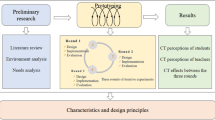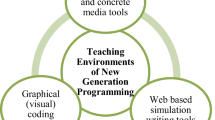Abstract
How to teach CT skills and the quality of students’ understanding of CT are research issues we need to address. In this study, an unplugged programming activity was designed, developed, and implemented. The results were evaluated to serve as an example of how CT can be integrated into mathematics education. We used the Poly-Universe educational game to design an unplugged programming activity. Then we used it to develop pre-service teachers’ CT skills and investigate their opinions about using this game in their future teaching. This game serves as an additional tool that can be employed to integrate CT and mathematics education creatively and engagingly. In this study, we investigate the possibilities of using this game to develop the pre-service teachers’ CT skills and explore their opinion about using it in their future teaching. This study is modeled by a Type 1 instructional product design and development study. Twenty-two pre-service mathematics teachers participated in this study. The study was conducted in four phases: explanation of the game, theoretical CT, practical CT, and pre-service teachers as task creators. Data were collected using a questionnaire and analyzed using descriptive statistics. The results showed that the participants found the activity interesting, enjoyable, and useful for teaching. It was also found that the activity promoted collaboration and increased pre-service teachers’ confidence in problem-solving. The study provides insight into using unplugged programming and the Poly-Universe game to integrate CT principles into mathematics education.
Access this chapter
Tax calculation will be finalised at checkout
Purchases are for personal use only
Similar content being viewed by others
References
Acevedo-Borrega, J., Valverde-Berrocoso, J., Garrido-Arroyo, M., del C.: Computational thinking and educational technology: a scoping review of the literature. Educ. Sci. 12(1), 39 (2022). https://doi.org/10.3390/educsci12010039
Aho, A.V.: Computation and computational thinking. Comput. J. 55(7), 832–835 (2012). https://doi.org/10.1093/comjnl/bxs074
Aranda, G., Ferguson, J.P.: Unplugged Programming: The future of teaching computational thinking? Pedagogika 68(3) (2018)
Barr, V., Stephenson, C.: Bringing computational thinking to K-12: what is Involved and what is the role of the computer science education community? ACM Inroads 2(1), 48–54 (2011). https://doi.org/10.1145/1929887.1929905
Bocconi, S., Chioccariello, A., Dettori, G., Ferrari, A., Engelhardt, K.: Developing Computational Thinking in Compulsory Education—Implications for Policy and Practice (2016). https://doi.org/10.2791/792158
Curi, M.E., Noguera, P., Vidal, L., Villalba, S.: Pensamiento Computacional + Matemática. Numeración. Ceibal (2022). https://bibliotecapais.ceibal.edu.uy/info/00019701?locale=es
Curzon, P., McOwan, P.W., Plant, N., Meagher, L. R.: Introducing teachers to computational thinking using unplugged storytelling. In: Proceedings of the 9th Workshop in Primary and Secondary Computing Education, pp. 89–92 (2014)
Denning, P.J.: Remaining trouble spots with computational thinking. Commun. ACM 60(6), 33–39 (2017)
Ezeamuzie, N.O., Leung, J.S.C.: Computational thinking through an empirical lens: a systematic review of literature. J. Educ. Comput. Res. 60(2), 481–511 (2022). https://doi.org/10.1177/07356331211033158
Fagerlund, J., Häkkinen, P., Vesisenaho, M., Viiri, J.: Computational thinking in programming with Scratch in primary schools: a systematic review. Comput. Appl. Eng. Educ. 29(1), 12–28 (2021). https://doi.org/10.1002/cae.22255
Falloon, G.: An analysis of young students’ thinking when completing basic coding tasks using Scratch Jnr. On the iPad: General thinking and computational work. J. Comput. Assist. Learn. 32(6), 576–593 (2016). https://doi.org/10.1111/jcal.12155
Gerson, S.A., Morey, R.D., van Schaik, J.E.: Coding in the cot? Factors influencing 0–17s’ experiences with technology and coding in the United Kingdom. Comput. Educ. 178, 104400 (2022). https://doi.org/10.1016/j.compedu.2021.104400
Hershkovitz, A., Sitman, R., Israel-Fishelson, R., Eguíluz, A., Garaizar, P., Guenaga, M.: Creativity in the acquisition of computational thinking. Interact. Learn. Environ. 27(5–6), 628–644 (2019)
Hickmott, D., Prieto-Rodriguez, E., Holmes, K.: A scoping review of studies on computational thinking in K–12 mathematics classrooms. Digit. Exp. Math. Educ. 4, 48–69 (2018)
Huang, W., Looi, C.K.: A critical review of literature on “unplugged” pedagogies in K-12 computer science and computational thinking education. Comput. Sci. Educ. 31(1), 83–111 (2021)
Huang, W., Chan, S.W., Looi, C.K.: Frame shifting as a challenge to integrating computational thinking in secondary mathematics education. In: Proceedings of the 52nd ACM Technical Symposium on Computer Science Education, pp. 390–396 (2021).
International Society for Teacher Education [ISTE] (2016). ISTE standards for students. https://www.iste.org/standards/for-students
Kaleli̇oğlu, F., Gülbahar, Y., Kukul, V.: A framework for computational thinking based on a systematic research review. Baltic J. Modern Comput. 4(3), 583–596 (2016)
Kallia, M., van Borkulo, S.P., Drijvers, P., Barendsen, E., Tolboom, J.: Characterising computational thinking in mathematics education: a literature-informed Delphi study. Res. Math. Educ. 23(2), 159–187 (2021). https://doi.org/10.1080/14794802.2020.1852104
Kotsopoulos, D., Floyd, L., Khan, S., Namukasa, I.K., Somanath, S., Weber, J., & Yiu, C.: A pedagogical framework for computational thinking. Digital experiences in math. educ. 3, 154–171 (2017).
Mouro, A.P., Margarida, C.B., Graça Lopes, M., Piedade, V.: Bringing together mathematics and philosophy with logic and poly-universe. Educ. Sci. 13(4), 356 (2023). https://doi.org/10.3390/educsci13040356
Moursund, D.G.: Computational thinking and math maturity: Improving math education in K-8 schools. D. Moursund (2006)
Mumcu, F., Uslu, N.A., Yıldız, B.: Teacher development in integrated STEM education: design of lesson plans through the lens of computational thinking. Educ. Inf. Technol. 28(3), 3443–3474 (2023)
Niemelä, P., Partanen, T., Harsu, M., Leppänen, L., Ihantola, P.: Computational thinking as an emergent learning trajectory of mathematics. In: Proceedings of the 17th Koli Calling International Conference on Computing Education Research, pp. 70–79 (2017). https://doi.org/10.1145/3141880.3141885
Nordby, S.K., Bjerke, A.H., Mifsud, L.: Computational thinking in the primary mathematics classroom: a systematic review. Digit. Exp. Math. Educ. 8(1), 27–49 (2022). https://doi.org/10.1007/s40751-022-00102-5
Papert, S.: Mindstorms: Children, computers, and Powerful Ideas. Basic Books (1980)
Papert, S.: An exploration in the space of mathematics educations. Int. J. Comput. Math. Learn. 1(1), 95–123 (1996)
Resnick, M., Maloney, J., Monroy-Hernández, A., Rusk, N., Eastmond, E., Brennan, K., Millner, A., Rosenbaum, E., Silver, J., Silverman, B., Kafai, Y.: Scratch: programming for all. Commun. ACM 52(11), 60–67 (2009). https://doi.org/10.1145/1592761.1592779
Richey, R.C., Klein, J.D.: Developmental research methods: creating knowledge from instructional design and development practice. J. Comput. High. Educ. 16(2), 23 (2005)
Richey, R.C., Klein, J.D.: Design and development research. In: Handbook of Research on Educational Communications and Technology, pp. 141–150 (2014)
Saxon, J.S.: Poly-universe in school education. PUSE (2018). Available at: http://www.poly-universe.com/. Accessed 6 Dec 2022
Schmidthaler, E., Schalk, M., Schmollmüller, M., Hinterplattner, S., Hörmann, C., Anđić, B., Rottenhofer, M., Lavicza, Z., Sabitzer, B.: The interdisciplinary implementation of poly-universe to promote computational thinking: teaching examples from biological, physical, and digital education in Austrian secondary schools. Front. Psychol. 14(1), 1–16) (2023). https://doi.org/10.3389/fpsyg.2023.1139884
Schmidthaler, E., Schalk, M., Schmollmüller, M., Sabitzer, B., Andjic, B., Lavicza, Z.: The effects of using poly-universe on computational thinking in biology and physical education. In: Proceedings of the 14th International Conference on Education Technology and Computers, pp. 24–31 (2022). https://doi.org/10.1145/3572549.3572554
Seow, P., Looi, C.-K., How, M.-L., Wadhwa, B., Wu, L.-K.: Educational policy and implementation of computational thinking and programming: case study of Singapore. In: Kong, S.-C., Abelson, H. (eds.) Computational Thinking Education, pp. 345–361. Springer, Singapore (2019). https://doi.org/10.1007/978-981-13-6528-7_19
Stamatios, P.: Can preschoolers learn computational thinking and coding skills with ScratchJr? a systematic literature review. Int. J. Educ. Reform 105678792210760 (2022). https://doi.org/10.1177/10567879221076077
Stettner, E., Emese, G.: Teaching combinatorics with “Poly-Universe”. In: Proceedings of Bridges 2016: Mathematics, Music, Art, Architecture, Education, Culture, pp. 553–556 (2016)
Sun, L., Hu, L., Zhou, D.: Improving 7th-graders’ computational thinking skills through unplugged programming activities: a study on the influence of multiple factors. Think. Ski. Creat. 42, 100926 (2021)
Tang, X., Yin, Y., Lin, Q., Hadad, R., Zhai, X.: Assessing computational thinking: a systematic review of empirical studies. Comput. Educ. 148, 103798 (2020)
Tekdal, M.: Trends and development in research on computational thinking. Educ. Inf. Technol. 26(5), 6499–6529 (2021). https://doi.org/10.1007/s10639-021-10617-w
Téglási, I.: Motivation and development–using poly-universe game in teaching mathematics and other school subjects. Athens J. Sci. 177 (2022)
Weigend, M.: Computer science unplugged and the benefits of computational thinking. Constr. Found. 14(3), 352–353 (2019)
Weintrop, D., Beheshti, E., Horn, M., Orton, K., Jona, K., Trouille, L., Wilensky, U.: Defining computational thinking for mathematics and science classrooms. J. Sci. Educ. Technol. 25(1), 127–147 (2016). https://doi.org/10.1007/s10956-015-9581-5
Wing, J.M.: Computational thinking. Commun. ACM 49(3), 33–35 (2006). https://doi.org/10.1145/1118178.1118215
Wing, J.: Research notebook: computational thinking—what and why. Link Mag. 6, 20–23 (2011)
Author information
Authors and Affiliations
Corresponding author
Editor information
Editors and Affiliations
Rights and permissions
Copyright information
© 2023 The Author(s), under exclusive license to Springer Nature Singapore Pte Ltd.
About this paper
Cite this paper
Anđić, B., Mumcu, F., Tejera, M., Schmidthaler, E., Lavicza, Z. (2023). Unplugging Math: Integrating Computational Thinking into Mathematics Education Through Poly-Universe. In: Dascalu, M., Mealha, Ó., Virkus, S. (eds) Smart Learning Ecosystems as Engines of the Green and Digital Transition. SLERD 2023. Advances in Sustainability Science and Technology. Springer, Singapore. https://doi.org/10.1007/978-981-99-5540-4_15
Download citation
DOI: https://doi.org/10.1007/978-981-99-5540-4_15
Published:
Publisher Name: Springer, Singapore
Print ISBN: 978-981-99-5790-3
Online ISBN: 978-981-99-5540-4
eBook Packages: Intelligent Technologies and RoboticsIntelligent Technologies and Robotics (R0)




